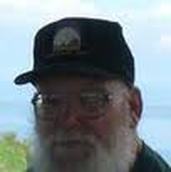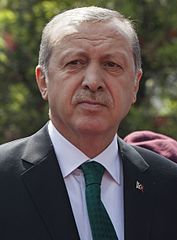 Recep Erdogan, Turkish president Recep Erdogan, Turkish president Turkey along with rebels it supports from the Free Syrian Army (FSA) started a new line of attack in northern Syria with tanks rolling across the Turkish border seizing several village from the Islamic State (IS). The incursion came from Kilis province, a province often targeted by IS rockets. Dogan news agency said Turkish tanks crossed into northern Syria from Kilis province on Saturday, while howitzers pounded ISIS positions in the area. There was a separate push by Turkish-backed rebels from the east. The rebels are mainly Arabs and Turkmen, part of the FSA. Last week rebels took the border town of Jarablus again with Turkish support. The operation called Euphrates Shield has the dual purpose of taking territory controlled by the Islamic but equally important to keep the US supported Kurds and their allies from advancing west of the Euphrates. The Turks worry that the Kurds could advance westward and link up with another Kurdish enclave further west. On Saturday Turkish tanks entered the town of al-Rai to support rebels who already control the town. Al-Rai is approximately 55km (34 miles) west of Jarablus. It is part of a 90 km corridor next to the border Turkey hopes to clear of the IS but also will serve to prevent any possible Kurdish expansion. A senior official, Zakaria Malahifiji said: "They took several villages, about eight villages. At first they took two and withdrew from them, but then reinforcements came and there was an advance. Turkish airplanes had carried out airstrikes on Arab Essa a village about 30 km west of Jarablus, that was captured today. Turkey disagrees with the US on the status of the Kurdish YPG militia. The US sees it as a key ally in attacking the IS whereas Turkey considers it a terrorist group. At the G20 meeting in China, Turkish president, Recep Erdogan, said: "There is no good terrorist. All terrorists are bad. All organizations involved in terrorism are cursed. This is how we see things and how we put up our struggle." Turkey claimed it had no desire to stay in Syria but was trying to protect its border from the IS and the YPG. It was thought that the rebels might move south towards the town of Mabij controlled by the Kurdish coalition of rebels supported by the United States. The Turks may believe that US pressure will convince the Kurds to move back to east of the Euphrates river. It remains to be seen if this will actually happen. It seems inevitable that the Kurds in Syria and the Turks will have difficult relations.
0 Comments
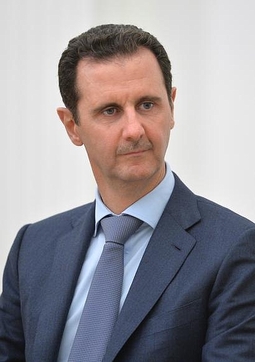 Bashar Al-Assad Bashar Al-Assad More than 50 U.S. State Department diplomats signed an internal memo that is critical of the Obama administration policy in Syria. In the memo, the diplomats urge Obama to carry out military strikes against the forces of President Bashar al-Assad to stop what the diplomats claim are persistent violations of the cease-fire in the civil war that has lasted five years already. A draft of the memo was obtained by the New York Times from a State Department official. The draft claims that U.S. policy has been "overwhelmed" by unrelenting violence in Syria and calls for "a more judicious use of stand-off and air weapons which would undergird and drive a more focused and hard-nosed U.S.-led diplomatic process." Such a move would no doubt result in an increased confrontation with Russia and would represent a radical shift in U.S. policy which is at present emphasizing the battle against the Islamic State rather than the overthrow of the Assad regime. However, diplomatic attempts to end the conflict led by Secretary of State, John Kerry are on the verge of collapse. The dissent was filed in the State Department "dissent channel". The channel was set up during the Vietnam War so that employees could register disagreements with policies without any fear of reprisal. Filings are relatively common but this dissent has an unusually high number of signatures. The signatures on the filing are almost all of mid-level working officials. There are no well-known higher officials on the list but it is known that many share the concerns expressed in the dissent. Kerry himself has suggested there be a stronger U.S. response in Syria to force Assad into a diplomatic solution. Obama has resisted such pressure and been backed up by military commanders who fear the result should Assad lose power. John Kirby, the State Department spokesperson declined to comment on the memo, but said Kerry respected the process. Robert Ford former US ambassador to Syria said: “Many people working on Syria for the State Department have long urged a tougher policy with the Assad government as a means of facilitating arrival at a negotiated political deal to set up a new Syrian government.” Ford resigned from the Foreign Service over the administration's policy on the conflict. The officials who signed the memo denied that they were advocating a "slippery slope that would end in a military confrontation with Russia". They insist there must be credible threat of military action to keep Assad in line. The threat should be followed by negotiation. Obama's policy in Syria has been designed to avoid further military entanglement in the civil war. It has been described as risk-averse. However, the U.S. is aiding Kurdish-led forces against the Islamic State. Attempts to aid moderate rebels previously have not been successful. The U.S. administration shows no sign it was willing to consider military strikes against Syrian President Bashar al-Assad's forces as the memo suggests. Saturday Update: Kremlin warns Washington against striking Assad's forces 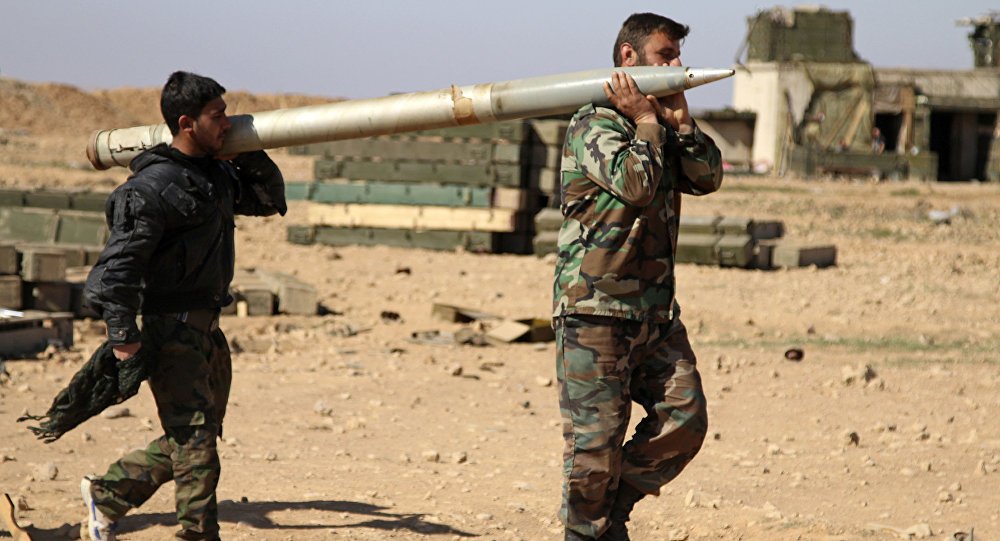 Assad's Syrian Army soldiers Assad's Syrian Army soldiers Assad's Syrian Army, is advancing towards the so-called IS capital in Syria Raqqa. An offensive launched in Hama province has now entered Raqqa Province to the west of Raqqa. Raqqa is the provincial capital of the province. While Assad forces are advancing from the west, an offensive is being launched by the Kurds and others with the backing of the US from the east and is covering some northern parts of Raqqa province. While earlier Raqqa was in an area controlled by the IS and with supply lines linking it to other possessions, those links are becoming increasingly contested. Both its supply lines to Mosul in Iraq and to Aleppo in Syria are coming under more pressure. The Syrian army advance is accompanied by Russian air strikes. Heavy Russian air strikes hit IS-held territory along with the ground offensive to facilitate the advance on the ground. Director of the UK-based Syrian Observatory on Human Rights, Ramil Abdel Rahman, said: "Regime troops backed by Russian air strikes and Russian-trained militia entered Raqqa province on Saturday morning." Rahman said at least 26 IS fighters were killed together with 9 Syrian government and allied troops. This is the first time that Assad troops have entered Raqqa province since 2014. The offensive brings troops within 40 kilometers of Tabqa where there is an airbase and a big reservoir. The Tabqa dam is just 40 kilometer upstream from Raqqa. It is also the target of a Kurdish-led offensive from the north supported by the US. Hashem Ahelbarra of Al Jazeera said that the push into Raqqa province was significant but there was still a long way to go: "Raqqa is besieged by government troops from the west and Syrian factions from the north and from the east - the south is linked to the bordering province of Deir Az Zor which is still an ISIL stronghold. Now, whoever controls Raqqa will face a mammoth challenge, which is basically securing a vast territory." He noted that both the Assad forces and the Kurdish fighters were involved in fighting at other locations and could not afford to keep a large troop presence in the area. The Kurdish-led forces are the Syrian Democratic Forces (SDF) are backed by US air strikes. They are advancing on the strategic city of Manbji on the west side of the Euphrates. It is a major transit point for IS fighters and supplies. The SDF had advanced within 8 kilometers ofr Manbji and had taken control of the Raqqa-Manbji roads helping to cut supplies to Raqqa. There are US special forces embedded with the SDF. The SDF also announced an offensive in the northern countryside of Raqqa province but this may have been a decoy operation while the main offensive was at Manbji. It is not clear if the Assad offensive and that of the SDF were coordinated. The effect is as if they were in any event. Turkey objects to the Kurdish fighters in the SDF considering them as allied to a terrorist Kurdish group. In the northern Aleppo countryside IS has launched a successful offensive in and around Azaz and Marea. 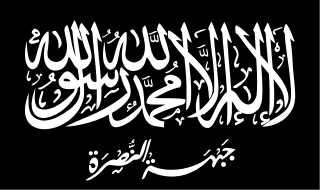 Flag of Jabhat Al Nusra the Nusra Front Flag of Jabhat Al Nusra the Nusra Front The US Air Force confirmed Monday that it had bombed and destroyed buildings belonging to Al-Qaeda-linked Nusra front. This is at least the third time the group has been struck since air strikes by the US and other members of the coalition attacking the Islamic State started bombing the Islamic State in Syria and Iraq. At first, it might not seem strange that the US should attack a group linked to Al Qaeda. After all, the war on terror is directed to a considerable extent against Al Qaeda. However, since the rise of the Islamic State(IS) a more radical jihadist group disowned even by Al Qaeda, the US focus has been on IS, especially since they have occupied a large swathe of territory in Iraq and Syria. When the bombing first started however, there was no mention of the Nusra front as a target. The Nusra front had been cooperating with other rebel groups, being one of the most effective groups against Assad but fighting also the Islamic State. Rebel groups were outraged by the bombing of a group who were sorely needed in the battle against Assad. The bombing was extremely unproductive for the US since the Nusra front turned against US-funded rebels. In time, the Front defeated Harakat Hazm the favourite moderate group of the CIA. In English Harakat Hazm means Steadfastness Movement. However, the group decided to disband after their defeat, some even joining the Front. When Al Nusra seized the main base of Harakat Hazm they also came into possession of a warehouse packed with US-supplied weapons. Many rebel groups did not like Hazm believing they were given special treatment by the Americans by being provided with many weapons whereas other groups got few or none. No other rebel groups came to the defense of Harakat Hazm. Given that groups that the US considered moderate were becoming fewer and fewer, commentators such as James Clapper, Director of National Intelligence, suggested that "moderate" could come to mean any group not associated with the Islamic State. There are suggestions that the Nusra Front might become new "moderates". Apparently Qatar has been active in trying to convince the group they should drop their ties with Al Qaeda so as to facilitate the re branding of the group. In terms of improving rebels' chances of gaining ground against Assad this would be an astute move. By continued bombing of Al Nusra positions the US has made any such move impossible. The US has attempted to distinguish the Nusra Front from what it calls the Khorasan. This group is said to be devoted to plotting attacks on the US and other western targets. However, the group is part and parcel of the Front and not separate. The first bombings killed not only some members of that group but other Nusra front members and civilians as well. Rear Admiral John Kirby a Pentagon spokesperson told reporters: Both the Islamic State and Nusra were born from Al Qaeda and from a military perspective they are very much one and the same. From the perspective of the rebels and their military objectives, bombing an ally in the military operations directed against Assad makes no sense and is counter productive even from a military point of view. The US seems to focus solely on the war on terror even if this means helping Assad in his battle with Syrian rebels. Sources http://www.bradenton.com/2015/03/09/5680338/us-bombs-nusra-headquarters-on.html http://www.washingtonpost.com/world/syrian-fighter-group-that-got-us-missiles-dissolves-after-major-defeat/2015/03/01/286fa934-c048-11e4-a188-8e4971d37a8d_story.html http://en.wikipedia.org/wiki/James_R._Clapper http://news.antiwar.com/2015/03/04/rebranding-us-may-look-to-al-qaeda-faction-as-new-moderate-allies-in-syria/ |
Like this writer's work please donate:
Ken Hanly
Ken is a retired philosophy professor living in the boondocks of Manitoba, Canada, with his Filipina wife. He enjoys reading the news and writing articles. Politically Ken is on the far left of the political spectrum on many issues.
Archives
November 2016
Categories
All
|
 RSS Feed
RSS Feed
